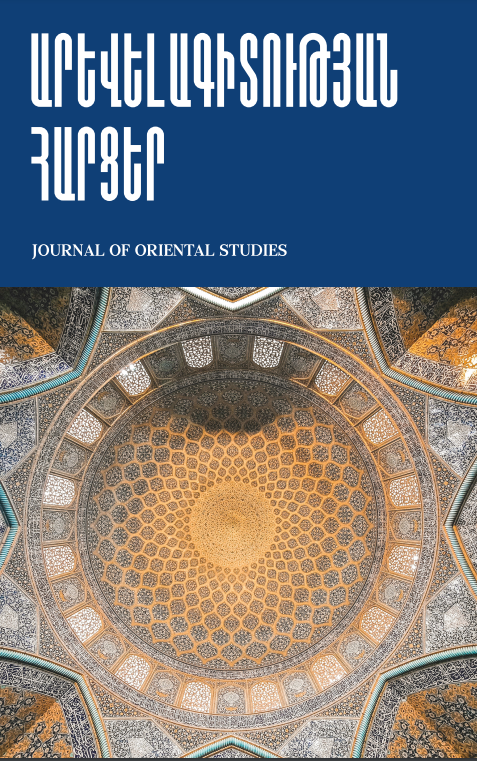THE TURKISH-ISLAMIC SYNTHESIS: FROM POLITICAL ADVENTURISM TO NATIONAL STRATEGY (1960'S TO 1983)
DOI:
https://doi.org/10.46991/jos.2024.25.1.192Keywords:
Islam, Nationalism, Nationalist Movement Party, Alparslan Turkesh, Turkish-Islamic synthesis, Kenan EvrenAbstract
In the second half of the 20th century, the idea of Turkish-Islamic synthesis emerged in the political field of Turkey, which was the fusion of Turkish nationalism and Islamic values. Originally practiced in the second half of the 1960s by the Nationalist Action Party led by Alparslan Türkeş, the synthesis aimed to create unity in the face of political and social polarization. In 1980 the military coup was pivotal in the context of the reshaping of the synthesis, as the military government began to take active steps to adopt the Turkish-Islamic synthesis and use it in the fight against leftist forces and to maintain social balance. In the article, we tried to study the development of the synthesis from the NAP to its formal adoption by the military government, paying attention to the cornerstones of the process, the socio-political context of the events and its impact on the Turkish society.
References
Ahmad F., The Turkish Experiment in Democracy, 1950-175, Hurst, London, 1977.
Aytürk İ., Nationalism and Islam in Cold War Turkey, 1944–69, Middle Eastern Studies, 50:5, pp. 693-719, 2014
Cagaptay S., The New Sultan: Erdogan and the Crisis of Modern Turkey, Bloomsbury Academic, 2020.
Eligür B., The Turkish-Islamic Synthesis and the Islamist Social Movement. In: The Mobilization of Political Islam in Turkey. Cambridge University Press, 85-135, 2010.
Erken A., Ideological Construction of the Politics of Nationalism in Turkey: The Milliyetçi Hareket Partisi (MHP), 1965–1980, Nationalism and Ethnic Politics, 20:2, 200-220, 2014.
Hale W., Generals and Politicians in Turkey: 1983-1990. The Turkish Yearbook of International Relations (25), pp. 1-20, 1995.
Hemmati K., “Turkey Post 1980 Coup D’etat: The Rise, the Fall, and the Emergence of Political Islam”. Illumine: Journal of the Centre for Studies in Religion and Society 12 (1). Victoria, British Columbia, Canada, 58-73. 2014.
Karakas C., Islam and Laicism Between the Interests of State, Politics, and Society, Peace Research Institute Frankfurt, 2007.
Moore C.H., Islamic Banks and Competitive Politics in the Arab World and Turkey, Middle East Journal 44, No 2, 1990.
Pallard C., Shaping Turkish Conservatism: Aydınlar Ocağı and the Turkish-Islamic Synthesis, EURAS Journal of Social Scienses, V. 2, I. 1, pp. 97-132. April 2022.
Poulton H., The Top Hat, the Grey Wolf, and the Crescent: Turkish Nationalism and the Turkish Republic, NYU Press, 1997.
Yeşilada, B.A., Islamic Fundamentalism in Turkey and the Saudi Connection, Universities Field Staff International, 1989.
Ayhan H., Türkiye’de Din Eğitimi (1920-1998), İstanbul, 1999.
Esin N., Devrim ve Demokrasi-Bir 27 Mayısçının Anıları, İstanbul, 2005.
Ekşioğlu K., Gerekçeli Anayasa, Yasa Yayınları, İstanbul, 1982.
Kafesoğlu İ., Türk İslam Sentezi, Ötüken Neşriyat, İstanbul, 1996.
Öznür H., Ülkücü Hareket, Volume 1, İstanbul, 1999.
Taşkın Y., Milliyetçi Muhafazakar Entelijansiya, İletişim Yayınları, İstanbul, 2007.
Turgut H., Şahinlerin Dansı. Türkeş'in Anıları, İstanbul, 1995
Türkeş A., Dokuz Işık, Sulhi Garan Matbaası Koll. Şti., İstanbul, 1967.
Türkeş A., Türkiye’nin Meseleleri, İstanbul, 1996.
Yalçın, A. K., Alparslan Türkeş’in Sürgündeki Siyasi Faaliyetleri (1960-1963). Iğdır Üniversitesi Sosyal Bilimler Dergisi, ss. 1-21, 2021.
Milletvekili Genel Seçimleri 1923 - 2011, Türkiye İstatistik Kurumu, 2012.
T.C. Başbakanlık Devlet Planlama Teşkilâtı (DPT), Milli Kültür: Özel İhtisas Komisyon Raporu, Devlet Planlama Teşkilâtı , Ankara, 1983.
Türkiye Cumhuriyeti Anayasası, Ankara, 1982.
Türkiye Cumhuriyeti Devlet Başkani Orgeneral Kenan Evrenin Söylev Ve Demeçleri, Ankara, 1982.
“Zorunlu din dersi Evren’in sevabı”, Mehmet Gündem’in Fettulah Gülen ile mülakatı, Milliyet, 17.01.2005
Downloads
Published
Issue
Section
License
Copyright (c) 2024 Gor Hovhannisyan

This work is licensed under a Creative Commons Attribution-NonCommercial 4.0 International License.
Authors will be entitled in ownership of the copyright for their publications.
Permitted third party reuse is defined by the following user license:
Creative Commons Attribution-Non-Commercial (CC BY-NC). CC BY-NC allows users to
copy and distribute the article, provided this is not done for commercial purposes. The users may
adapt – remix, transform, and build upon the material giving appropriate credit, providing a link
to the license. The full details of the license are available
at https://creativecommons.org/licenses/by-nc/4.0/.
Under this license, authors retain ownership of the copyright for their publications, but
grant Journal of Օriental Studies and Yerevan State University
Publishing house a non-exclusive license to publish the work in paper and electronic form and
allow anyone to reuse, distribute and reproduce the content as long as the original work is
properly cited. Appropriate attribution can be provided by simply citing the original work. No
permission is required from the authors or the publishers.

